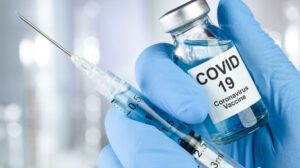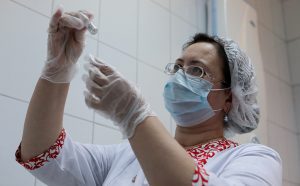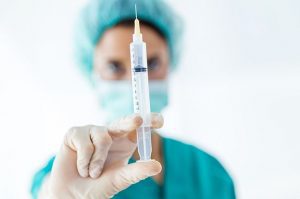
Germany allows entry into the country from June 25 for persons fully vaccinated against coronavirus (COVID-19) with vaccines approved by the European Medicines Agency.
“Starting from June 25, 2021, entry from Ukraine to Germany for people fully vaccinated against SARS-CoV-2 with vaccines approved by the European Medicines Agency (EMA) will be possible again. Fully vaccinated persons will be able to re-enter Germany for the purpose of visiting friends, acquaintances and relatives, as well as for tourism purposes. Visa-free travel for Ukrainian citizens with biometric passports will be possible again,” the German Embassy in Ukraine said in a statement. It is noted that those persons who have received vaccinations with one of the vaccines indicated on the Paul-Ehrlich-Institute website will have the right to enter Germany, if at least 14 days have passed since the day of inoculation with the last required dose or vaccine that requires one dose.
“Currently, this only applies to vaccines recognized by the European Medicines Agency. The list of vaccines is also planned to be expanded and supplemented with other vaccines with similar protective standards as soon as the necessary tests are completed,” the embassy said.
It is noted that it is necessary to provide a European digital COVID certificate or an analogue of vaccination confirmation in digital or paper form, issued in German, English, French, Italian or Spanish.
“For people who have recovered from the disease, the vaccine can consist of only one dose of the vaccine. In order to confirm the full vaccination, people who have recovered must also be proved that they were sick with the SARS-CoV-2 coronavirus before vaccination. Confirmation of the fact of the disease must be a positive result of PCR test,” the embassy said.
In addition, persons under the age of 12 and who have not yet received COVID-19 vaccine may, if they have documented proof of the test (PCR or antigen test), enter Germany accompanied by one or both fully vaccinated parents. Persons who have not yet turned six years old do not need confirmation of testing.

Starting from June 25, Ukrainian people fully vaccinated against COVID-19 can enter Germany under certain conditions, the German Embassy in Kyiv said.
“Fully vaccinated persons will be able to re-enter Germany for visiting family and friends, as well as for tourist purposes. Starting from June 21, 2021, one can apply for the necessary visas for the intended purpose of travel both at the embassy and at the Visametric visa center,” the German Embassy said on its website on Friday.
It is indicated that those persons who have been inoculated with one of the vaccines listed on the website of the Paul-Ehrlich-Institut (PEI) will have the right to enter Germany, if at least 14 days have passed from the date of inoculation with the last required dose of vaccine or with vaccine that requires only one dose.
“Now this only applies to vaccines recognized by the European Medicines Agency [EMA]. The list of vaccines is also planned to be expanded and supplemented with other vaccines with similar protective standards as soon as the necessary trials are completed,” the embassy said.
Further information, especially that regarding the requirements for documentary evidence of received vaccinations, can be found on the website of the Federal Ministry of the Interior, Building and Community, the German Embassy said.

Almost every second Ukrainian plans to be vaccinated against coronavirus, while 19% of citizens intend to do this in the near future, the same number plan to be vaccinated later, another 10% will be vaccinated only when they have to do it for formal reasons, according to the results of the survey entitled “Attitude of Ukrainian citizens to vaccination against COVID-19,” held by the Razumkov Center from May 21 to May 26.
It is reported that compared to March 2021, the proportion of respondents who answered that they do not intend to get vaccinated against coronavirus decreased from 51.5% to 43%.
At the same time, the share of those who intend to get it in the near future (or have already received such a vaccination) increased from 12% to 19%, from 16% to 19% – the share of those who intend to be vaccinated, but later, 10% (the same as in March) intend to do this only when it is necessary for formal requirements (for example, for a trip abroad).
The older the respondents, the more often they express their lack of desire to get vaccinated (their share increases from 38% among those aged 18 to 29, to 51% among those aged 60 and over).
Among those who do not give up their intention to get vaccinated against COVID-19, 59% are ready to do it only if it is free (this is more than in March, by 7%), 23% of them are ready to pay for the vaccine, and another 6% are willing to pay to get vaccinated out of turn. The older the respondents, the more often they answer that they are ready to be vaccinated only free of charge (the proportion of such increases from 49% among those who are between 18 and 29 years old, to 77% among those who are 60 and over).
Those respondents who do not intend to be vaccinated are more often motivated by the fact that, in their opinion, the vaccines used in Ukraine are not sufficiently effective and safe, but they are ready to be vaccinated with “some other” vaccine (this answer is given by 31% of those who do not intend to get vaccinated).
Although, compared to March, the proportion of those who do not trust the vaccine has decreased (then it was 45% of those who refused to be vaccinated). Some 30% of them motivate their refusal by the fact that, in their opinion, the risks of vaccination exceed the risks of the disease itself, 15% – by the fact that they have already had coronavirus, 12% have medical contraindications, and 7.5% believe that the likelihood that they will get COVID-19 is very low.
The survey was conducted by the sociological service of the Razumkov Center from May 21 to May 26, 2021 using the method of face-to-face interviews at the place of residence of the respondents.
A total of 2,017 respondents aged 18 and over were interviewed in all regions of Ukraine, with the exception of Crimea and the occupied territories of Donetsk and Luhansk regions, based on a sample representing the adult population in terms of basic socio-demographic indicators. The theoretical sampling error (excluding the design effect) does not exceed 2.3% with a probability of 0.95. The research was carried out with the financial support of the representative office of the Friedrich Naumann Foundation for Freedom in Ukraine.

Some 51% of Ukrainians are ready, without hesitation, to refuse vaccination against COVID-19, and in a month this level has grown by 7%, according to the data of a sociological survey conducted by the Ukrainian Institute of the Future (UIF), presented at the Interfax-Ukraine information agency on Monday.
Some 19% of Ukrainians preferred to postpone the issue of vaccination for a while, 15% are ready to be vaccinated, but taking into account the country of its production, 10% agree to be vaccinated, no matter what, and 5% are ready to be vaccinated only on condition of a free procedure.
The survey was conducted from March 3 to March 13, 2021 among 2,400 respondents aged 18 and over throughout Ukraine (excluding the temporarily occupied territories of Donbas and the Autonomous Republic of Crimea) by the “face-to-face” method using a structured interactive questionnaire. The statistical error does not exceed 2.05%.

More than 50% of Ukrainians do not intend to be vaccinated against COVID-19, according to results of a study conducted by the sociological service of the Razumkov Center from March 5 to 9.
According to the results of the poll, 51.5% of respondents answered that they do not intend to get vaccinated against coronavirus, 12% intend to get vaccine in the near future (or have already received such a vaccine), 16% intend to do it, but later, 10% intend to do it only when it will be necessary for formal requirements (for example, for a trip abroad), 10% have not decided yet.
At the same time, according to the research, the older the respondents, the more often they express a lack of desire to be vaccinated (their share increases from 43.5% among those who are from 18 to 29 years old, to 57% among those who are 60 and over).
Among those who do not give up their intention to get vaccinated against COVID-19, 52% are ready to be vaccinated only in case that vaccination is free, 22.5% of them are willing to pay for it, and another 5% are willing to pay to get vaccinated out of turn (21% were undecided).
The older the respondents, the more often they answer that they are ready to be vaccinated only free of charge (the proportion of such increases from 42% among those who are 18 to 29 years old, to 64% among those who are 60 and over).
Those respondents who do not intend to be vaccinated are most often motivated by the fact that, in their opinion, the vaccines used in Ukraine are not sufficiently effective or safe, but they are ready to be vaccinated with “some other” vaccine (this answer is given by 45% of those who do not intend to vaccinate).
So, 27% of them motivate their refusal by the fact that, in their opinion, the risks from vaccination exceed the risks from the disease itself, 10% by the fact that they have already had coronavirus, 7% have medical contraindications, 3% believe that the probability that that they will get COVID-19, is very low.
Justification of refusal to vaccinate with insufficient effectiveness or insufficient safety of vaccines used in Ukraine is most common among representatives of the younger age group (18-29 years old) (54% of those, who do not intend to vaccinate against COVID-19, motivate their refusal by this).
The survey was conducted by the method of face-to-face interviews at the place of residence of the respondents. 2,018 respondents aged 18 and over were interviewed in all regions of Ukraine, with the exception of Crimea and the temporarily occupied territories of Donetsk and Luhansk regions, according to a sample representing the adult population in terms of basic socio-demographic indicators.
The theoretical sampling error (excluding the design effect) does not exceed 2.3% with a probability of 0.95.

All family doctors will be vaccinated against COVID-19 through vaccination rooms, which will open from next week, Health Minister Maksym Stepanov said.
“Next week we will open vaccination rooms. All family doctors will be vaccinated against COVID-19 through these rooms,” he said on the Freedom of Speech (Svoboda Slova) program on ICTV on Tuesday night.
According to the national vaccination plan, at least nine mobile vaccination teams per region should work now, but these plans are not being implemented in the field, Stepanov said.
“Local authorities were supposed to reach not 10,000, but more than 12,000-14,000 vaccinations per day. The mobile team did not come here, they did not vaccinate there – this is how they deploy in the field,” he said.
Nevertheless, Stepanov said that in the coming days the rate of vaccination will accelerate and will reach more than 10,000 vaccinations per day.
“Today there was a rather tough conversation, including with some heads of regions,” he said.
Stepanov also said that 1.5 million doses of AstraZeneca (Covishield) vaccine should be delivered to Ukraine by March 31. The Ministry of Health expects permission for their export from the Government of India.
As reported, the first batch of 500,000 doses of Oxford/AstraZeneca (Covishield) vaccine was delivered to Ukraine on the morning of February 23.
Oxford/AstraZeneca is produced at the facilities of the Serum Institute (India) and has the local (trade) name Covishield. It was registered for emergency use in Ukraine on Monday, February 22.
In addition, Ukraine received confirmation of deliveries of 2.2-3.7 million doses of Oxford/AstraZeneca vaccines under COVAX mechanism in the first-second quarter of 2021. In addition, this vaccine will be purchased directly from the manufacturers for public funds.
Ukraine has also signed additional direct contracts for the supply of vaccines against COVID-19, developed with the participation of AstraZeneca (UK-Sweden) and NovaVax (USA) and manufactured at the facilities of the Serum Institute (India).